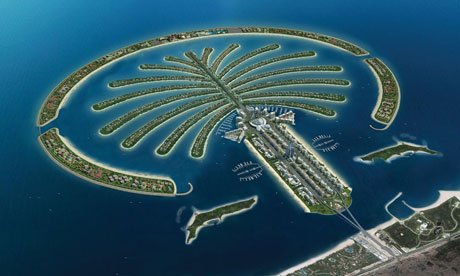Jonathan Steele and Jon Boone
Ambassador in Kabul reports pervasive ‘wealth extraction’ by establishment and apparent powerlessness of US to stop it

Palm Jumeirah in Dubai where the Kabul Bank chairman, Sher Khan Farnood, owns 39 properties, according to WikiLeaks cables. Photograph: PA
Rampant government corruption in Afghanistan – and the apparent powerlessness of the US do to anything about it – is laid bare by several classified diplomatic cables implicating members of the country’s elite.
Rampant government corruption in Afghanistan – and the apparent powerlessness of the US do to anything about it – is laid bare by several classified diplomatic cables implicating members of the country’s elite.
In one astonishing incident in October 2009 the then vice-president, Ahmad Zia Massoud, was stopped and questioned in Dubai when he flew into the emirate with $52m in cash, according to one diplomatic report. Massoud, the younger brother of the legendary anti-Soviet resistance leader Ahmad Shah Massoud, was detained by officials from the US and the United Arab Emirates trying to stop money laundering, it says.
However, the vice-president was allowed to go on his way without explaining where the money came from.
The cable, sent by the ambassador, Karl Eikenberry, detailed the colossal scale of capital flight from Afghanistan – often with the cash simply carried out on flights from Kabul to the UAE.
“Vast amounts of cash come and go from the country on a weekly, monthly and annual basis. Before the 20 August [presidential] election $600m in banking system withdrawals were reported; however in recent months some $200m.”
Couriers are said to usually carry the money on Pamir Airlines, which is jointly owned by Kabul Bank and influential Afghans such as Mahmood Karzai, one of the president’s brothers, and Mohammad Fahim, a Tajik warlord who was Hamid Karzai’s vice-presidential running mate in the August 2009 election.
The cable records that exporting cash is encouraged by the fact that “drug traffickers, corrupt officials and to a large extent licit business owners do not benefit from keeping millions of dollars in Afghanistan and instead are motivated to move value into accounts and investments outside of Afghanistan”.
Other high-profile Afghans involved in amassing extraordinary wealth in Dubai include Sher Khan Farnood, the chairman of Kabul Bank who was disgraced this summer after corrupt loans at the bank almost brought down Afghanistan’s fragile financial system.
The document notes that Farnood – an enthusiast for high-stakes international poker tournaments – was said to own 39 properties on the Palm Jumeirah, a luxury man-made peninsula in Dubai.
The cable adds: “Many other notable private individuals and public officials maintain assets (primarily property) outside Afghanistan, suggesting these individuals are extracting as much wealth as possible while conditions permit.”
Two other cables provide graphic detail of such “wealth extraction” on the part of the governors of key provinces in eastern Afghanistan. Usman Usmani, governor of Ghazni, and Juma Khan Hamdard, governor of Paktiya, are accused of systemic corruption, theft of public funds and extorting money from construction contractors on a regular basis.
“Credible sources indicate that some of the most senior government officials in [Ghazni] province have chronically engaged in significant corrupt acts: embezzling public funds, stealing humanitarian assistance, and misappropriating government property, among others,” one cable says, basing its conclusions on interviews with a wide range of law enforcement officials and other citizens.
“The consistency and scope of explicit and detailed allegations lends veracity to charges that pervasive corruption defrauds the people of meaningful government services and significantly undermines popular support for the Afghan government.”
In Paktiya, Hamdard is alleged to take bribes from contractors by sending in armed men who hold contractors at their job sites until the money is paid. “He allegedly has illicit contacts with insurgents in Parwan, Kunar, and Kabul provinces, as well as Pakistani intelligence (ISI) and Iranian (affiliation unknown, possibly IRGC) operatives, through his business in Dubai,” the cable says, adding that he is allegedly a business partner in Dubai of the son of Gulbuddin Hekmatyar, a leading Pashtun warlord allied to the Taliban.
“Evidence collected in the case points to corruption involving US funds and actively undermining Afghan government counter-insurgency policy,” the cable adds. “If contractors complain to the [Nato provincial reconstruction team] about him, he will have them chained and dragged to his office.”
 لراوبر ویب پاڼه لراوبر يو افغان – تازه خبرونه
لراوبر ویب پاڼه لراوبر يو افغان – تازه خبرونه


